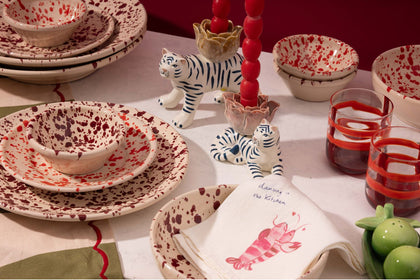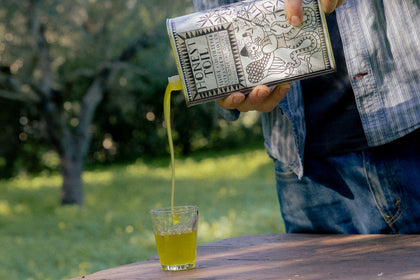Pandoro: Ultimate Buyer's Guide
by Holly Thomson

Browse hundreds of extraordinary Christmas food gifts at Sous Chef. Or for the foodie Christmas gift that every food-lover is hoping for, see our finest Italian panettone.
Welcome to everything you need to know about Italy's traditional pandoro cake!
What's the difference between pandoro and panettone? How do Italians eat pandoro? And what's the best way to serve pandoro cake at Christmas? Read on...
In this guide, we look at everything you need to know about Pandoro!
Pandoro Cake - Everything You Need To Know
Pandoro is a sweet, buttery cake that originates from the northern Italian city of Verona.
Its name means “golden bread” in Italian, reflecting its rich yellow colour, which comes from the large quantities of butter and eggs used in its preparation.
The cake is baked in a tall, star-shaped mold that gives it its distinctive eight-pointed form.
Pandoro is typically served during the Christmas and New Year holidays, and while it may not be as widely known outside Italy as Panettone, it enjoys a devoted following.
Unlike Panettone, which is filled with candied fruit and raisins, Pandoro has a simpler flavour profile, often enhanced by a dusting of powdered sugar just before serving.
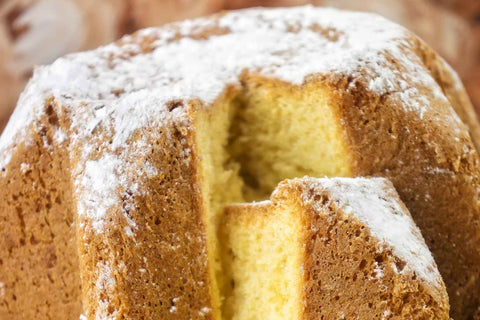
A Brief History of Pandoro
Pandoro’s roots can be traced back to 18th-century Venice, where a similar type of sweet, leavened bread was popular among the aristocracy.
This early version, known as "pane d'oro" or "golden bread," was considered a luxury item due to the high cost of ingredients like butter, eggs, and fine flour.
Over time, the recipe evolved, and by the 19th century, the cake we now recognize as Pandoro became a staple of Italian holiday cuisine.
The cake’s rise in popularity is often credited to Domenico Melegatti, a Veronese pastry chef who patented the star-shaped mold in 1894. His version of Pandoro refined the traditional recipe and introduced the eight-pointed star shape that is still used today.
Melegatti’s innovation helped establish Pandoro as a holiday favorite, not just in Verona but throughout Italy.
Pandoro Recipe - How Is Pandoro Made?
Creating a delightful Pandoro at home involves a straightforward yet meticulous process.
To start, gather the essential ingredients: high-quality flour, sugar, eggs, butter, lemon, vanilla, and yeast. You can also add sweeteners or cream when serving such as chocolate and whipped cream.
The dough preparation begins by combining these elements in precise measurements to achieve the distinct rich and buttery flavour that defines Pandoro. The yeast acts as the leavening agent, contributing to the soft and airy texture of this traditional Italian Christmas cake.
Once the dough is thoroughly mixed, it undergoes a crucial rising process. This involves two rounds of leavening, allowing the dough to rest and expand, enhancing the overall texture.
The distinctive eight-pointed star shape of Pandoro is formed during the final proofing stage. This intricate design is achieved by layering the dough in a star-shaped mold, ensuring that each slice reveals a beautiful and festive pattern.
The traditional cooking method for Pandoro involves baking it in a star-shaped mold at a precise temperature. The slow and careful baking process is key to achieving the golden exterior while maintaining a moist and fluffy interior.
While it may seem intricate, making Pandoro at home is a rewarding experience, and having the right equipment, including a star-shaped mold or a star-shaped pan, is essential.
This ensures that your homemade Pandoro captures the authentic taste and appearance of this iconic Italian holiday treat.
How to Eat Pandoro
Indulging in the delightful experience of eating Pandoro is a simple yet joyful affair.
How should I slice Pandoro?
Typically, it is sliced horizontally, revealing its star-shaped interior. The best way to enjoy it is to cut it into even slices, allowing everyone to relish the soft, buttery layers.
It's a cake meant for sharing, perfect for festive gatherings or casual get-togethers with loved ones. The star-shaped slices add a touch of elegance to your serving, making it a visually appealing treat on any occasion.
What do you serve it with?
While it's delightful on its own, you can elevate the experience by serving it with accompaniments like powdered sugar, whipped cream, or a dusting of cocoa.
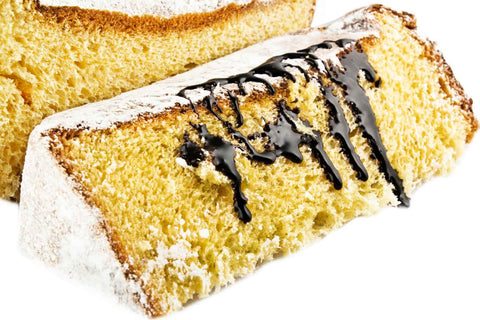
Can you make it into layers?
Some enthusiasts get creative by turning Pandoro into layers, spreading fillings or toppings between the slices for a unique twist. This flexibility makes Pandoro a charming addition to any dessert table, offering both simplicity and room for creative culinary exploration.
Whether you prefer it plain or adorned with your favorite toppings, eating Pandoro is a delightful experience that brings a touch of Italian festivity to your palate.
Pandoro vs Panettone
When it comes to the festive season in Italy, the choice between Pandoro and Panettone can spark lively debates.
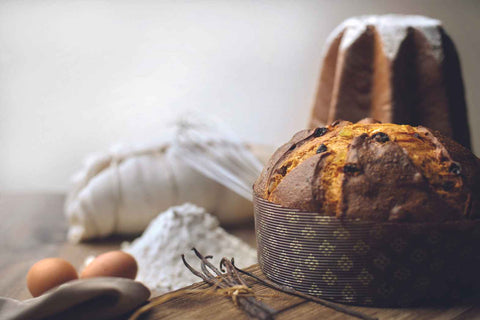
Difference between Pandoro and Panettone
The key distinction lies in their shapes and flavours. Pandoro, translating to "golden bread," is a star-shaped cake with a rich, buttery taste.
Conversely, Panettone, or "big bread," features a cylindrical shape, studded with candied fruits and raisins, offering a more complex flavour profile.
when it comes to height, the distinction between Pandoro and Panettone is quite straightforward. Pandoro, true to its name meaning "golden bread," typically stands taller than Panettone. The star-shaped Pandoro reaches impressive heights, making it a visually striking centerpiece during holiday gatherings.
On the other hand, Panettone, with its cylindrical form, tends to be shorter in stature.
The variation in height is part of the charm and visual appeal of these traditional Italian cakes, adding a delightful touch to festive tables and celebrations.
Do people eat them in a similar way?
In terms of consumption, Pandoro is often enjoyed in its pure form or lightly dusted with powdered sugar, highlighting its simple yet delightful flavour.
Panettone, with its fruit-infused texture, is typically sliced thin and served. Both cakes are commonly exchanged as gifts, reflecting the Italian tradition of sharing joy during the festive season.
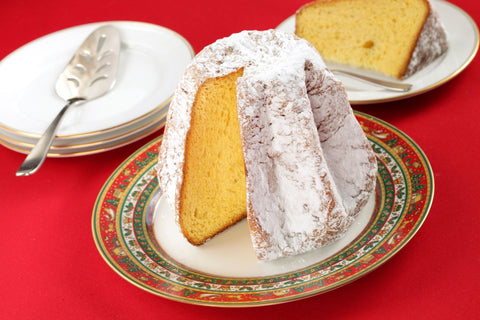
The popularity of these breads often depends on regional preferences, with Pandoro originating from Verona and Panettone from Milan.
While both cakes are iconic symbols of Italian holiday celebrations, the choice between them boils down to personal taste, making them cherished elements of the country's culinary heritage.
Can you give someone Pandoro or Panettone as a gift?
When deciding between Pandoro and Panettone during the festive season, it's essential to consider their roles as gifts and their physical attributes.
The answer is yes! Both Pandoro and Panettone hold a significant place in Italian holiday traditions, and can be exchanged as thoughtful gifts among friends and family.
These cakes, each with its unique characteristics, symbolize the spirit of sharing and celebration during the festive period. Gifting either Pandoro or Panettone reflects a gesture of goodwill and festive cheer, aligning with the tradition of expressing warm wishes through culinary delights.
Which Pandoro should I buy?
Deciding on the perfect Pandoro is a matter of taste and occasion, and at Sous Chef, we offer a curated selection to cater to diverse preferences.
Muzzi Pandoro
We're busy planning Christmas 2026 - check back for product arrivals and new launches closer to the time. It's going to be a good one!
Unwrap this beautiful Traditional Muzzi Pandoro paper and discover a traditional Italian soft, golden and butter-enriched cake.
Muzzi pandoros are made with the finest ingredients – fresh eggs, delivered daily, along with carefully selected butter, milk and sugar.
The panettones and pandoros are made using a traditional recipe that has been perfected over many years, and with a mother sourdough yeast that is carefully tended.
Loison Salted Caramel Pandoro
This magnificent Loison Salted Caramel Pandoro is a rich and buttery dough, filled with salted caramel cream.
A slice of this light and golden Italian bread is delicious with a cup of tea, or at any time of day.
Beautifully wrapped, the Loison Salted Caramel Pandoro makes a fantastic gift, and it’s something a little different to panettone.
Loison ClassicPandoro
The Loison classic handwrapped pandoro is an Italian Christmas treat you can enjoy at any time of day. The golden, cake-like bread is rich and buttery.
Pandoro is traditionally coated with powdered sugar just before serving. The best way to do this is to empty the sugar into the bag containing the pandoro, hold the bag tightly closed and then shake! Slice and enjoy for breakfast, afternoon tea or dessert.
READ MORE: The ultimate guide to Italian panettone, and how to buy the best one

